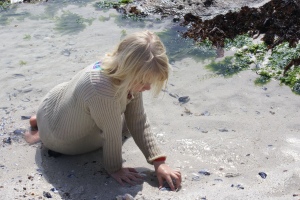I was recently invited to a tea party and was astounded to hear the following conversation:
“My friend’s son can count to a hundred and his only two!”
“Really?”
“Well Joey is only four and he can write his first and last name, and his brother’s and sisters’ too.”
“Do you think he actually understands what he’s writing?” asked a sceptic.
“I think so. My son started reading at that age. We used the cereal box method. And he was very good with that.”
“Well, Adam, can name all the planets in correct order and those dinosaur names just roll off his tongue. I can’t even pronounce them.”
I could see that one mother was worried. Her daughter was four and she could boast no mental feat.
And when the rest of the congregation turned to her, she bravely said: “Sarah can sing all the Disney songs.”
They were not impressed. Everybody can do that.
The mother kept quiet during the rest of the morning. Later she confessed to me, that on leaving she headed straight to the nearest educational bookshop only to emerge with bags full of: Easy reading for Toddlers; Count to a hundred while Potty Training; Know your Volcano from your Earthquake.
Three weeks later I bumped into one of my ‘tea party friends’ at the supermarket. “Hey, could we organise a playdate. Johnny’s been nagging me.”
She stopped her trolley and pulled out a hefty diary and flipped it open. “Right,” she said and sounded like a sergeant major ready for the troops.
“Ok, Friday we are full. He’s got little league and an art class after that. Monday its science day, Tuesday he’s doing extra maths, Wednesday’s music day and Thursday he’s got swimming. We could come by after music – it’s only half an hour. What’s your schedule like?”
My jaw dropped. I did not have to check. I knew we only had swimming as an activity at this stage. “Wednesday’s fine. Let’s say from three to five?”
Walking towards my car I shook my head. We were talking about five year olds after all.
When do these kids have time to play?
I felt worried. Should I be? I phoned the wisest person I know. My mother and this was her response:
“What do you remember about your own childhood?”
“It was great. We climbed trees, build mud cakes and sand castles, swam, and messed around in the veld. Played ‘Chips’ on our bicycles or ‘Buck Rogers’, we sang like Abba, dressed up in mum’s clothes when she wasn’t there. Baked cakes, had marble tournaments, dared it each other to do crazy things. Explored, discovered … hunted snakes and followed buck tracks. Dug for treasure at the seaside. Caught fish. Made up my own tunes on the piano. Sang till my throat was sore.”
That was my childhood. I only started reading and writing when I went to school for the first time at age six.
“And how did you feel about yourself?”
“Great. I loved my childhood. I knew I was loved for just being myself. Of course I fought with my brothers, who didn’t? But there was no pressure. No one expected cognitive gymnastics from me. It was like one long play date. I had fun!”
“What are the most important things you want your child to know?”
“They must know that they are loved unconditionally. That I appreciate them for being just the way they are, unique and talented in their own way. And they must know how to be safe. To trust their instincts and to know their rights. My children must know that we are a family and that we look out for one another. They must respect other people and be sensitive towards others. They must practise compassion and forgiveness. They must be able to stand up for themselves and be proud of who they are. They must develop their own interests and passions.”
“So just because your brother could read before he went to school, did I pressure you into reading as well?”
“No.”
“What did your father and I do with you every night until you could all read properly?”
“You told us stories and read for us. Every night.”
“Yes, we told stories. We took you to the library every week. It was the outing of the week.”
Then she said, “I read somewhere that the single biggest predictor of high academic achievement and high ACT scores is reading to children. Not flash cards, not workbooks, not fancy preschools, not educational toys or computers, but parents taking the time every day to read books to their children.”
“Do you think the most accomplished child in school is necessarily the smartest or the happiest?”
“No.”
“If you got rid of 90% of your child’s toys, would they still have enough to play with?”
“Yes.”
“Do you want you’re five-year old to stress as much as you do, be able to multi-task, and play an instrument while naming the natural phenomenon you only heard of in high school?”
“No.”
“Do you consider your child a show-piece that you can brag about at parties to others?”
“No!”
“So, what are you worried about?”
“I guess nothing. I want them to remember the warmth, love and support of family life.”
“That’s right, honey. There’s enough time for them to learn all the other stuff. And you know what, the other stuff is not that important anyway.”

